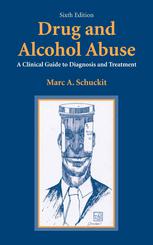

Most ebook files are in PDF format, so you can easily read them using various software such as Foxit Reader or directly on the Google Chrome browser.
Some ebook files are released by publishers in other formats such as .awz, .mobi, .epub, .fb2, etc. You may need to install specific software to read these formats on mobile/PC, such as Calibre.
Please read the tutorial at this link: https://ebookbell.com/faq
We offer FREE conversion to the popular formats you request; however, this may take some time. Therefore, right after payment, please email us, and we will try to provide the service as quickly as possible.
For some exceptional file formats or broken links (if any), please refrain from opening any disputes. Instead, email us first, and we will try to assist within a maximum of 6 hours.
EbookBell Team

4.7
36 reviewsMark Schuckit’s Drug and Alcohol Abuse has been a clinical mainstay for over a quarter century. Now the author’s trusted expertise is available in a new Sixth Edition, thoroughly revised for content, updated references, and streamlined for increased usefulness.
Schuckit combines his experience as practitioner, researcher, and teacher to give professionals and students across the health and mental health disciplines a working knowledge of drug-related pathology, beginning with pharmacology, drug mechanisms, and genetic factors. And the Sixth Edition is as accessible as its predecessors, striking the right comfort level for the classroom or the emergency room.
-Clinical/emergency orientation suited to both chronic misuse and acute situations
-Coverage reflects current trends in alcohol, drug, and multidrug use, abuse, and dependence
-Concise chapters for quick reference
-Updated bibliography—approximately 80% of citations are post-2000
-Diagnostic information reflects upcoming changes to the DSM
-Latest strategies in treatment (psychological and pharmacological) and rehabilitation
All material is organized for ease of use, whether the reader needs fast answers in a crisis, seeks new ideas for helping long-term patients or clients, or is just becoming familiar with the different drug classifications. This new edition offers expanded knowledge of a wide-ranging problem and a growing and clinically important population, and authoritative suggestions for effective care.